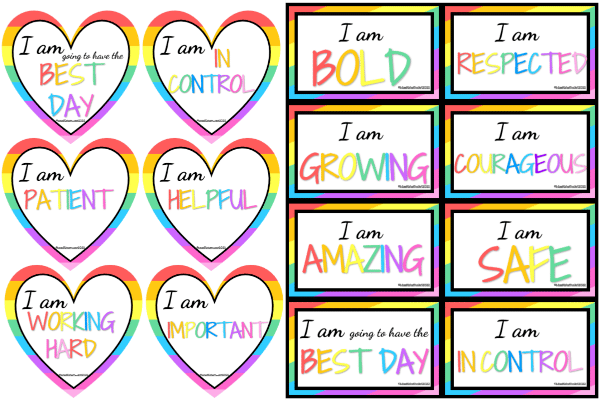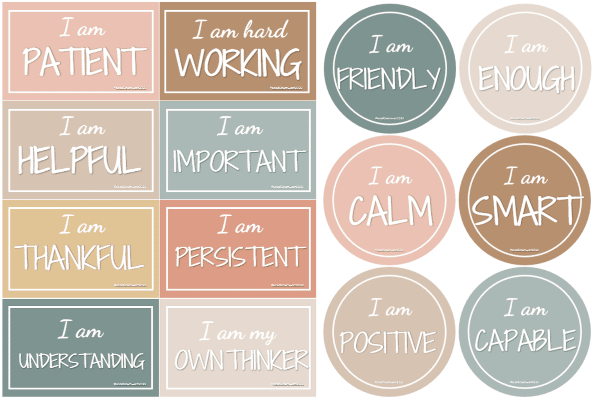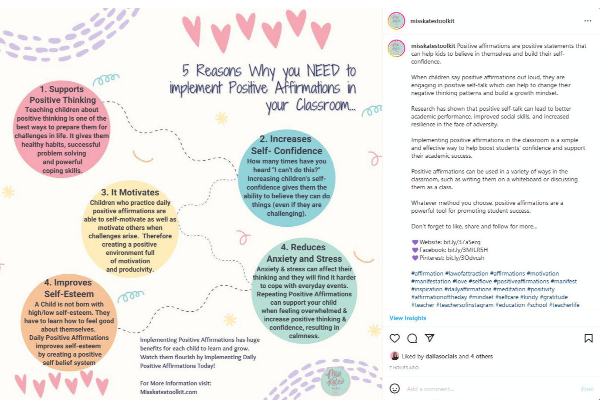Read Time 8 mins
What We'll Cover
- The importance of social-emotional learning.
- The best way to use affirmations with children.
- Is there any evidence behind using positive affirmations?
This listing of 17 positive affirmations for kids will enhance your child’s overall development and mental health. I never heard about positive affirmations until the age of 24. It’s helped me with a number of things like building self-esteem, introducing positive thinking and has become an inner strength for me in growing a positive mindset.
Why are positive affirmations for kids important?
Affirmations are important for children because they help to train their minds to think more positively.
With affirmations, children learn to focus on the good things in their lives, and they start to believe that they can achieve anything they set their minds to.
Positive affirmations also help to build children’s self-confidence and reduce negative self-talk, two essential ingredients for a happy and successful life.
By teaching children to affirm themselves regularly, we give them the tools they need to lead happy, successful lives.
What are positive affirmations?
According to positive thinking expert Norman Vincent Peale, “Positive thinking is a form of thought which habitually looks for the best results from the worse conditions.”
In other words, affirmations are statements that you say to yourself to believe something positive about yourself.
This can be especially helpful for kids, who may be facing challenges at school or home.
By repeating affirmations, children can learn to think more positively about themselves and their abilities. As a result, they may be more likely to approach life with confidence and optimism.
With regular practice, affirmations can be a powerful tool for helping children (and adults!) to lead happier, healthier lives.
Many parents use affirmations with their children as a way to boost self-esteem and encourage positive thinking. But how do affirmations actually work? And are they effective for children?
Let’s break it down – Simple positive phrases that help children develop
Affirmations are simply positive messages or statements that affirm something to be true – for example, “I am smart and capable.”
When we say affirmations out loud, or even just think them to ourselves, they help to reprogram our subconscious mind and change our beliefs about ourselves.
(Keep reading to see my 17 favorite quotes for positive affirmations)
Over time, this can lead to improvements in self-esteem, motivation, and overall well-being.
There is some research to support the efficacy of affirmations
However, the research is not extensive. There is less research specifically on affirmations for children.
With that said, many parents report seeing positive changes in their children after using affirmations regularly. And I can personally say I saw huge growth in my students, with daily engagement of positive affirmations.
If you’re interested in giving affirmations a try with your child, look for affirmations that are specific, realistic, and positive.
With time, they may just start to see themselves in a whole new light.
How do affirmations and a positive mindset work?
We’re really trying to help increase emotional regulation, social-emotional skills as well as confidence.
When we say affirmations out loud, or even just think about them regularly, we can start to believe them more and more. This, in turn, can lead to positive changes in our lives.
What we think about ourselves is how we develop ourselves
The way we feel about ourselves has a direct impact on how we behave. When we feel worthless, we act as though it was worthless. This can lead to a downward spiral in which our negative feelings are reinforced by our actions.
On the other hand, when we feel special and loved, we believe we’re unique and loved by others. This can lead to a positive feedback loop in which our positive feelings are reinforced by our actions.
The bottom line is that our self-esteem has a powerful influence on our behavior. If we want to change our behavior, then we need to start by changing the way we feel about ourselves.
The stronger and more believable the message is, the more our subconscious mind will believe it and help us to develop it.
Why do we need to be kind to ourselves?
It is important to be kind to ourselves because that is how we learn to like and respect ourselves. When we are kind to ourselves, it can help us feel better when things are tough. I believe it is also essential to remember that we are not perfect.
Everyone makes mistakes sometimes, and that is okay. What is important is that we learn from our mistakes and try to do better next time.
It is helpful to encourage the learning of positive self-talk
In a world where bullying has become so big, daily affirmations have helped so many children overcome self-confidence issues and encourage self-love.
The evidence behind positive affirmations for kids
Most of us are familiar with positive affirmations or “self-talk.” This is when we tell ourselves things like, “I can do this!” or “I am successful!” in order to boost our confidence and help manage emotions.
Self-talk has been shown to help improve performance in both children and adults.
One report said that self-talk helped children improve their maths scores. Similarly, a Forbes article found that positive self-talk and mental rehearsal help athletes all over the world. Read on further for more evidence.
Positive affirmations for kids.
Many children struggle with self-doubt and low self-esteem. However, it is important to remember that everyone has unique talents and qualities that make them special.
By filling your mind with positive thoughts, you can start to see yourself in a more positive light.
It can also be helpful for a child to talk to a caring person who can help them see all the exciting experiences that are awaiting them in life.
How to use affirmations with children
There are many different ways to use affirmations with children. One way is to have them repeat positive affirmations to themselves throughout the day.
It’s also worth reading how to implement these as part of your classroom management strategies. Read my complete guide to learn more.
They can say things like “I am smart,” “I am loved,” or “I am capable” whenever they need a confidence boost.
Another way to use affirmations is to write them down and post them somewhere where your child will see them regularly, such as on the refrigerator or in their bedroom. The obvious places for a school or kindergarten are entrances, hallways, and lockers for example.
You can also create an affirmation jar that your child can reach into whenever they need a pick-me-up.
Introduce positive self-talk
Explaining to your child how and why we should do an affirmation will help make them understand their purpose and how it works. Keep it exciting! Affirmation is a way of thinking that encourages feelings of self-worth and happiness.
Repeating affirmations
It can also help affirm the self-love of a person if repeated several times. You should work on 1 affirmation every day.
If the person is struggling with a particular thing, it might be a good idea to have them for a long period of time.
This small investment in positive thinking WILL have a big impact on reducing negative thought patterns.
What are some good positive affirmations for kids?
There are many affirmations for kids out there, but it’s important to choose ones that resonate with your child.
You can find affirmations for all sorts of different areas, including bedtime, school, and friendships.
When introducing affirmations to children, I use one rule, it has to start with “I am” and it has to be positive. I feel this supports the child’s understanding of what is required from an affirmation.
Some of my positive affirmations for children are:
- I am loved
- I am Kind
- I am Strong
- I am valuable
- I am capable
- I am important
- I am safe
- I am successful
- I am powerful
- I am brave
- I am creative
- I am beautiful
- I am enough
- I am confident
- I am persistent
- I am calm
- I am going to have the best day
(I always end on this one and the children LOVE it)
At what age should you start affirmations?
Children can be using affirmations from as soon as they can talk. They may not be able to read what is displayed, but with role-modeling and adults reading them. They can repeat it. An affirmation at this age provides strong foundations for when they begin school.
How often should you do affirmations?
Ideally, you should aim to do affirmations daily. However, if you’re just getting started with using affirmations, it’s okay to start off with doing them a few times per week. As you become more comfortable.
Do positive affirmations help with anxiety?
Of course, affirmations are just one tool that can be used to help with anxiety. They can be a powerful tool, especially for kids who are still learning how to manage their emotions.
Take control from day to day and reduce negative thoughts
Affirmations can help children to feel calmer and more in control. They can also remind them that they are capable of handling whatever comes their way.
If your child is struggling with anxiety, try incorporating some positive affirmations into their daily routine and create a positive mindset.
Positive affirmation is a useful tool when dealing with stress and phobias.
When your child experiences social anxiety or stress they may have unintentional thoughts. Maybe they’re just negative attitudes toward returning to school.
In this case, negative self-talk should be positively restructured with helpful affirmations.
Affirmations for kids are a simple and effective way to help children build a more positive outlook, confidence, and resilience.
When children repeat positive affirmations, they start to believe in themselves and their abilities.
Introducing positive affirmations for kids
As a parent, you want your children to grow up to be happy and successful. This is why I like to introduce positive affirmations at an early age as I said earlier. This way your child develops this habit early and will grow having the skills to be successful in positive thinking.
Social-emotional learning is paramount for children.
Simply reading it helps people express positive feelings. Help your child understand their purpose and how it works by doing an affirmation together.
Let them know they can think of an affirmation whenever they need a boost or take a few deep breaths to calm down.
Reading affirmations out loud is also a great way to start or end the day on a positive note. You could start by stating them in the bathroom mirror in the morning or night, make it part of your routine.
Find humor and make it a fun activity
If you’re not sure how to introduce affirmations to your children, one approach is to tell them a story.
You might tell them about a time when you faced a challenge and used positive affirmations to help you overcome it. Or you could read them a book in which the main character uses positive affirmations to achieve their goals.
Why we need to be kind to ourselves?
It gives us a positive attitude and teaches us a positive attitude towards others. As we age we often start making ourselves criticized and we often lose our confidence and resilience.
It is helpful to encourage the learning of positive self-talk in the early years of a child to prevent self-criticism as firmly believed systems have been built.
Do children need affirmation? More evidence from leading experts
When individuals’ self-image has been challenged, they are driven to reaffirm the self’s integrity according to Claude Steele’s (1988) affirmation of the self-theory.
Claude M. Steele is a psychologist and professor at Stanford University. He specializes in studying how stereotypes can impact the academic achievement of students and other behavioral traits.
Steele has written about self-image, self-affirmation, and the value of self-regulation in addictive behaviors.
Steele has pioneered new ways of thinking in the area of social psychology, and his research has assisted minority students in improving their academic performance.
Steele’s recent work has focused on the role that the self plays in education, and he is developing a “self-efficacy” theory with significant implications for how we inspire children to reach their full potential.
For children, this may mean doing well in school despite being teased or bullied by classmates. For adults, this may mean standing up for themselves in a meeting even though they are worried about being seen as too aggressive.
In both cases, the goal is to protect and enhance one’s self-esteem.
Urge Your Children to Be Positive
What you might not realize is that positive affirmations can also have a profound impact on your child’s mental health.
By regularly affirming your child’s positive qualities, you can help them to develop a positive self-image and to view themselves as an amazing person.
Great ideas that help us have a positive impact and be better role models
Positive affirmations are a great way to help your child overcome challenges.
By regularly affirming your child’s positive qualities, you can help them to achieve greater success in life.
So the next time you tell your child how much you love them, take a moment to also tell them what an amazing person they are.
It just might make all the difference in the world!
Get in touch with me on my socials here and get some freebies whilst you’re at it.
Love Miss Kate





